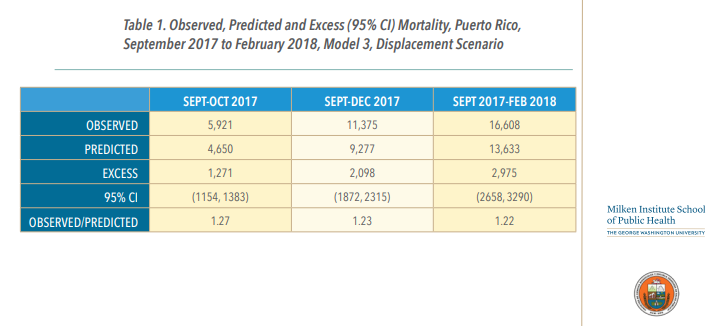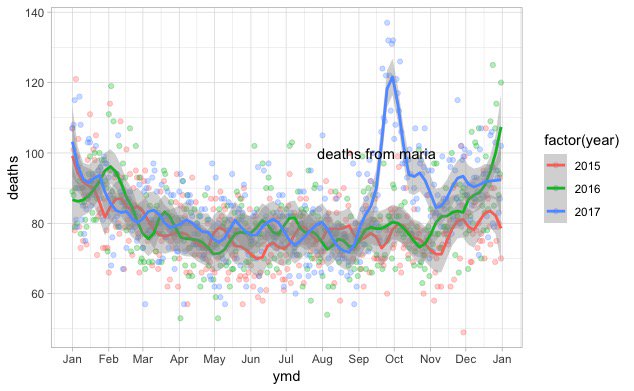What does Trump claim?
- He is confronted with research using mortality data and a household survey showing that several thousand people died in the months after the hurricanes hit; absent other causes these excess deaths are attributed to the hurricanes. On-the-ground observations corroborate the cost of lives.
- His response on twitter (part 1, part 2) is
- "3000 people did not die in the two hurricanes that hit Puerto Rico"
- "This was done by the Democrats"
- "in order to make me look as bad as possible".
In context this must be understood as a refutation of the research, not as a linguistic fight about fine print ("in" vs. "due to"). We must also take into account that we are talking about Presidential twitter messages here, not well thought-out White House press releases. As if to highlight the absurdity, the first message has the maximum length of 280 characters leaving no space for a more exact wording.
Conclusion: What we see is an understandable defense against damaging claims by doubting their validity and accusing the researchers of bias. We are not having a semantic discussion.
Bias
- The study of mortality data by the George Washington University was commissioned by the government of Puerto Rico. The governor, Ricardo Rosselló, is member of the New Progressive Party which is not directly affiliated with the U.S. Democratic Party. In national U.S. politics they side on a case-by case basis with Democrats and Republicans, according to a dissertation mentioned on wikipedia. While the Puerto Rican government has an obvious interest in deflecting blame and inflating numbers, the allegation of Democratic Party bias appears wrong.
- The household survey published in the New England Journal of Medicine lists medical institutions as supporters; the disclosure forms do not list conflicts of interest or financial contributions by third parties. With no discernible connection to the Democratic Party Trump's allegation appears wrong for this study as well.
Conclusion: The allegation of Democratic Party bias appears wrong for the actual research. So the question is whether the research is factually correct or not; and if yes, how it is possible to arrive at these vastly different numbers.
Are the claims of thousands of deaths scientifically defensible?
Trump does not make any factual or methodological claims regarding the science of the studies beyond quoting the number of deaths reported immediately after the hurricane. I have not seen the studies criticised by third parties either.
Conclusion: The studies appear conducted properly according to scientific standards and the results should be valid.
How can we explain the discrepancy?
Interestingly, today a disaster researcher, Scott G. Knowles, discusses exactly this question in the New York Times. He quotes the George Washington University study that estimates 2,975 fatalities.
His explanation of the discrepancy with Trump's assertion of no more than a few dozen victims focuses on the developments in disaster research over the last decades. Until about the 1960s disasters were understood as events with defined limits in time and space, and consequently only damage in this time and space was considered. But as the result of ongoing research,
by the 1990s there was an emerging consensus that the historical background and long-term aftereffects of disasters were just as important, if not more so, than the event itself, because a disaster is really an interconnected chain of occurrences.
This is actually the same paradigm shift that happened in other social sciences like history towards what one could call a "systemic" view. Historic events are not isolated and can be properly understood only in context.
Knowles continues
We will never understand why some people are vulnerable and others aren’t if the focus is only on a disaster as an event. Nor will we comprehend why some communities recover quickly while others languish, nor grasp the debilitating consequences of post-traumatic stress disorder. So, too, we will be unable to comprehend the burden of care for future generations, or past victims. Event thinking is amnesiac; worse, it inhibits planning for the disasters to come.
But if one’s interest is in playing down the impact of disaster, then event thinking is the ticket. You may avoid learning anything significant about the causes and consequences of what happened, but you can get back to the business of building, even if it is in dangerous places.
Knowles then outlines how the systemic understanding of disasters, "based in scientific reality", facilitates better preparation and better handling of the aftermath.
He provides a direct answer to President Trump's point of view:
The clear counterpoint is to acknowledge that a disaster is a process that reveals our values as a society. A disaster’s beginning and end might be obscure, but that doesn’t excuse us from figuring out the causes and true costs.
Illustration: Compare with a shipwreck
I would like to compare Trump's claim to that of an imagined designer of the RMS Titanic who defends himself thusly: "This bogus claim that 1500 people died in the sinking of the Titanic is grossly exaggerated in order to make me look bad. When I saw the ship go down there were fewer than 1000 people on board. I don't know how they arrive at these inflated numbers." The 1500 number was, of course, calculated from the difference in the ship's passenger manifest vs. the number of rescued people. The logical conclusion was that the ones not left behind in the ship drowned in the Arctic Sea, technically after the actual event.
This comparison may serve as an illustration why it is relevant to consider a disaster "an interconnected chain of occurrences" which started before the actual event (manufacturing flaws, lack of emergency exercises) and continued afterwards: people drowned in the cold water and potentially died of pneumonia hours and weeks later. With this more systemic view we are able to draw valuable conclusions which are lost when we focus just on the actual sinking: People embedded in groups (families, friends) have a higher survival chance; people with health insurance have a better chance to survive illness from exposure later on; adequate safety procedures improve the overall outcome of collisions with icebergs, etc.
It's obvious that nobody would make the claim that the 500 drowned people did not die in the sinking of the Titanic. We are probably making this attribution without much thought because the connection in time, space and cause is very tight. In a hurricane the connections are not so obvious: The aftermath is playing out over thousands of square miles, months afterwards, and in ways whose relationship to the storm is not as immediately obvious. But the structural parallels are striking. Focusing on the sinking or the hurricane as an isolated event deprives the decision makers of the knowledge base for adequate preparation and response.
Bottom line:
From the perspective as laid out by Knowles, a narrow and obsolete traditional understanding of "disaster" excludes the true cost in lives.


